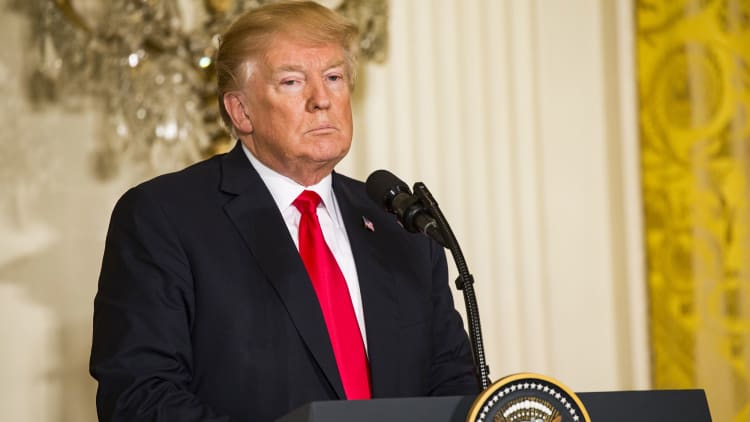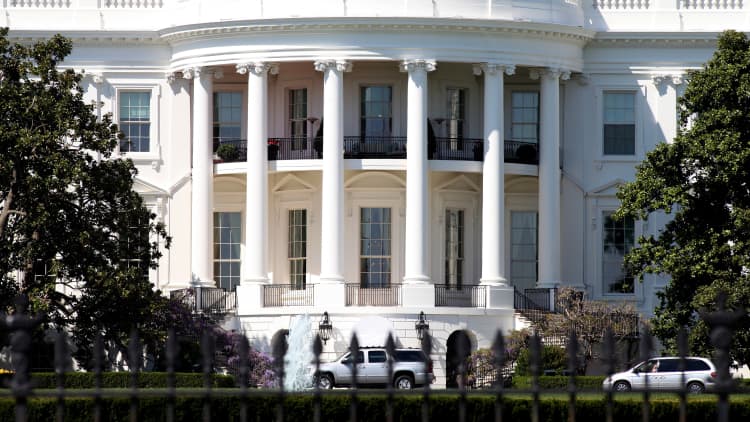
There is a very real fear spreading through Wall Street following Gary Cohn's departure from the White House that President Donald Trump's inner-nationalist will be fully unleashed. People are right to be afraid.
Cohn, the National Economic Council director and former Goldman Sachs president, served as the main voice inside the West Wing urging Trump not to tear up the North American Free Trade Agreement or apply sweeping tariffs on steel and aluminum that could spark a global trade war.
He lost the tariff argument and will now be gone when a final decision on NAFTA gets made, leaving the field to protectionists like Commerce Secretary Wilbur Ross and trade advisor Peter Navarro.
Don't expect Treasury Secretary Steven Mnuchin to ride to the rescue and push Trump away from his deeply rooted desire to punish American trading partners over grievances he's held onto for decades. Mnuchin comes from the free-trading school, but he's not inclined to tell Trump things he doesn't want to hear.
One White House insider told me the Treasury secretary is among the "army of sycophants" around Trump who care more about staying in the boss' good graces than advocating any particular policy position.
Depending on who is named as a replacement, Cohn's departure could also decimate the NEC, one of the most functional departments of a largely dysfunctional White House. If Trump decides to slide Navarro into the job, Wall Street would likely react very badly. So would staffers like tax policy guru Shahira Knight. Most of the NEC staff could bolt under Navarro.
The same applies to former hamburger executive Andrew Puzder, who had to withdraw as Labor secretary nominee over spousal abuse allegations. Puzder remains popular with some in the West Wing, but he would not be viewed as a strong NEC director and many current staffers would leave.
OMB Director Mick Mulvaney also gets some mentions for NEC, and he would likely be less disastrous than some of the other choices. But at the moment, Wall Street is clinging to hopes that Trump will pick his longtime outside advisor Larry Kudlow for the slot. Kudlow, a senior CNBC contributor, might not be quite as pugnacious and eager to battle the nationalists as Cohn, but he is a passionate free-trader clearly unafraid of voicing his disagreements with the president's policies.
Kudlow, who had urged Cohn to stay on the job, would fit Trump's stated preference to have a team of rivals in the White House. Anyone from the protectionist school in the NEC job would turn the West Wing into a team of mercantilists, with potentially ruinous results for Wall Street and the broader economy.
"Clearly he's a free-trader and Wall Street likes free-traders. And he's got the Goldman Sachs pedigree and that's a very comforting thing for people," Wedbush Securities' Steve Massocca told me of Cohn's departure. "It's clearly going to be at least a minor negative for markets. But probably not a huge downturn, especially if Trump picks Kudlow, who would be a wonderful choice."
Nationalists in the White House celebrated Cohn's announcement, texting reporters and allies that one of the main "globalists" was now out of the way. They will certainly try to push back against Kudlow or any other non-protectionist who gets the NEC job.
The larger question for markets is whether investors will now stop ignoring Trump's clear desire to rip up trade deals and apply tariffs to try and restore America's manufacturing glory days. Until now, investors have mainly blown off this side of Trump, deciding instead to embrace the tax cut and deregulatory agenda. Now one of the architects of that agenda is gone. And Trump for the moment will have no restraining voices willing to challenge him.
He's also heading into a midterm election and eventual presidential re-election campaign that will likely drive him to try and make good on promises made to blue-collar voters in the industrial Midwest.
Wall Street is afraid of what Trump will do under this set of circumstances. And it should be.
—Ben White is Politico's chief economic correspondent and a CNBC contributor. He also authors the daily tip sheet Politico Morning Money [politico.com/morningmoney]. Follow him on Twitter @morningmoneyben.
WATCH: WH puts out image of unity on heels of Cohn departure



